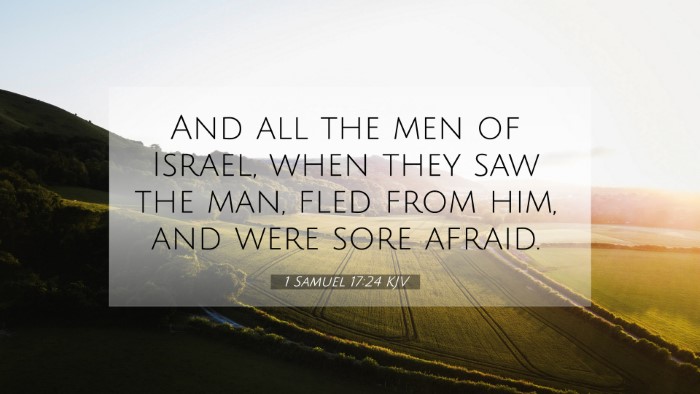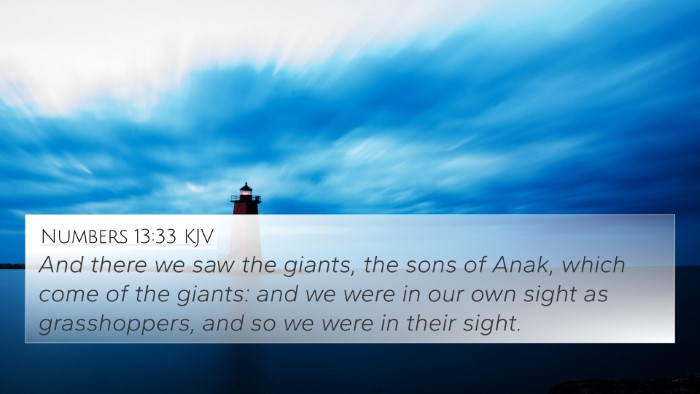1 Samuel 17:24 Meaning and Interpretation
In 1 Samuel 17:24, we observe a pivotal moment during the confrontation between the Israelites and the Philistines, specifically focusing on the giant Goliath's challenge. The verse states:
"And all the men of Israel, when they saw the man, fled from him, and were sore afraid."
This verse highlights the deep fear and intimidation that Goliath incited among the Israelite soldiers, which sets the stage for the remarkable events that follow, particularly David's eventual confrontation with Goliath.
Insights from Public Domain Commentaries
-
Matthew Henry's Commentary:
Henry notes that the reaction of the Israelite men illustrates the overwhelming fear that Goliath evoked with his stature and taunts. This fear reflects the larger spiritual battle faced by Israel as they grappled with their faith against the physical might of their enemies. The Israelites' retreat symbolizes a lack of trust in God's power, contrasting David’s faith which ultimately leads to victory.
-
Albert Barnes' Notes:
Barnes points out that the reaction of the men of Israel is indicative of their spiritual state at the time. Their fear showcases not only the intimidating physical presence of Goliath but also their internal struggles with courage and faith. Barnes emphasizes that this expositional moment serves to prepare the reader for David’s role as a contrast to the fearful soldiers—his faith in God brings a different response to the same situation.
-
Adam Clarke's Commentary:
Clarke remarks that the sight of Goliath generated sheer terror among the Israelites. His perspective includes a focus on the psychological battle within the Israelite camp, where the looming shadow of fear threatened to overshadow their trust in the Lord. Clarke also relates this fear to how believers today may respond to challenges, urging a return to faith in God's promises rather than succumbing to human limitations.
Cross References and Thematic Connections
This verse connects to several important themes in the Bible, highlighting the nature of fear, the importance of faith, and God's sovereignty in battles. Below are some key cross-references that speak to these themes:
- 1 Samuel 10:22 - This verse reflects how Israel once sought after a king due to fear of external enemies.
- Isaiah 41:10 - God reassures His people not to fear, as He is with them, providing a contrast to the fear exhibited in 1 Samuel 17:24.
- Philippians 4:6-7 - This instruction to not be anxious but pray reflects a New Testament perspective on dealing with fear.
- 2 Timothy 1:7 - Paul’s reminder that God has given a spirit of power, love, and a sound mind serves as encouragement against fear.
- Psalm 27:1 - This verse declares the Lord as the light and salvation, reinforcing the need to trust in God rather than being afraid.
- Romans 8:31 - "If God be for us, who can be against us?" highlights the assurance of God’s presence and strength in facing adversaries.
- Hebrews 11:1-2 - This passage discusses faith as the assurance of things hoped for; David's faith can be viewed as a fulfillment of this promise.
- Matthew 14:27 - Jesus' reassurance to His disciples about fear echoes God's consistent call to be courageous amidst life's storms.
- 1 Peter 5:7 - The call to cast all anxieties upon God aligns with the overarching theme of reliance on God rather than fear.
Thematic Bible Verse Connections
The narrative surrounding 1 Samuel 17:24 not only illustrates the immediate fear that the Israelite soldiers faced but also opens a window into the broader theme of faith versus fear found throughout the Bible. Understanding this verse invites a deeper exploration into how faith can confront fear, an exploration that resonates through both the Old and New Testament.
Understanding Fear and Faith:
-
Fear in the Old Testament: Throughout the Old Testament, fear often emerges in moments of uncertainty or impending conflict, as seen in the Israelites’ fear of Goliath, who challenged their very existence.
-
Faith in Action: The story of David provides a critical counter-narrative where faith leads to action against fear, illustrating the transformative power of trust in God amidst giants.
-
Prophetic Fulfillment: The historical context of Israel’s battles provides prophetic insight into the salvation narrative where Jesus Christ conquers the ultimate fear of death.
Tools for Bible Cross-Referencing
For those exploring Bible verse connections, tools for cross-referencing can greatly enhance understanding. Utilizing a Bible concordance or cross-reference Bible study guide allows for the identifying connections between scriptures that may seem distant at first glance. Here are some effective methods:
- Using a Bible Concordance: A concordance lists words found in the Bible and provides references to each instance, helpful for finding links between verses.
- Bible Cross-Reference Guides: These guides categorize verses based on themes, allowing for comparative Bible verse analysis.
- Digital Bible Study Tools: There are numerous software and applications that facilitate cross-referencing, making it easier to find related scriptures.
Application of Cross-Referencing in Personal Study
Engaging in cross-reference Bible study deepens our understanding of scripture. By examining how different verses interact, believers can uncover layers of meaning that enrich their faith journey.
For individuals seeking to understand specific themes in the Bible, using effective cross-referencing techniques becomes essential. Here’s how to apply this in your scripture study:
- Identify Key Themes: Start by identifying the main themes you're studying, such as fear versus faith.
- Utilize Cross-References: Look up verses that connect to your theme, such as those listed above.
- Analyze Contexts: Consider both the immediate context of the verses you’re studying and the broader narrative they contribute to.
- Reflect on Personal Application: After studying the connections, reflect on how the insights relate to your life and faith journey.
- Discuss with Others: Engage in discussions with others studying the same themes to gain varied insights and perspectives.
In summary, 1 Samuel 17:24 serves as both a historical account of fear in the face of overwhelming odds and a theological reflection on the importance of faith. Through thoughtful analysis, connections can be made that transcend time and reinforce the message that with God, we need not fear. Utilize the insights from public commentaries, along with modern tools for cross-referencing, to deepen your understanding of the eternal truths presented in scripture.









